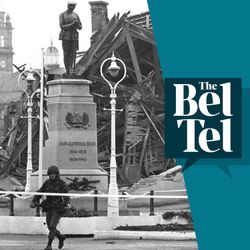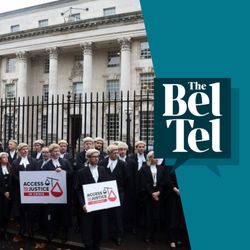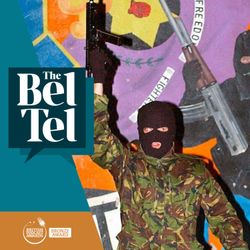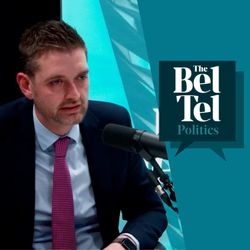Share

The BelTel
The UVF and the savage '70s: Shankill Butchers, Gusty Spence, and the Dublin Monaghan Bombings
•
The UVF began the 1970s with a campaign to cleans Catholics and Catholic owned businesses from Protestant dominated areas. With the IRA’s campaign at its height, the UVF moved from targeting nationalist and moderate political figures to simple sectarian murder – many of its victims just teenagers. By the mid-70s a notorious group emerged from the UVF which brought the savagery of the troubles to a new level – the Shankill Butchers. Ciarán Dunbar is joined by author and historian Aaron Edwards.
More episodes
View all episodes

Northern Ireland and ‘Nazi Tinder’: Single, lonely, and looking to ‘breed white’
25:35|The right-wing dating site Whitedate.net, dubbed the ‘Nazi Tinder’, has dozens of members across Ireland. But only one of them mentions love as a motivation, many mention the need to “breed” for the “white race”. The site’s thousands of profiles were leaked online after a hack. A lonely Belfast man said he was looking for a “lady who has never been soiled by other races” and “a bride willing to have children, in order to stop the destruction of our people.” Olivia Peden is joined by Belfast Telegraph reporter Kurtis Reid.
Former PSNI detective says Fermanagh girl Kelly Lynch’s death warrants murder investigation
26:47|On St Patrick’s Day 2024, Gardaí made a grim discovery, the body of a young woman in a canal just outside Monaghan town. She was 23-year-old Kelly Marie Lynch, originally from County Fermanagh. A former PSNI detective who has investigated a number of prominent murders, including the 2020 killing of Katie Simpson by Jonathan Creswell, believes Kelly Lynch’s case should be upgraded to a murder investigation. Host: Fionnán Sheehan Guest: Catherine Fegan & James Brannigan
Enniskillen Bombing: Reports claim female who ‘led’ massacre living a ‘comfortable life’ in Fermanagh
29:58|A woman identified by Garda as the Enniskillen bombing IRA commander is living an ‘ordinary life’ in Fermanagh – reports have claimed. Twelve people died in the massacre which took place during a Remembrance Day service in 1987. Relatives of the victims, including Stephen Gault, who lost his father and was injured in the attack, say they are sickened by the allegation. David O’Dornan spoke to Ciarán Dunbar.
Allison Morris: NI teens shocked to find out AI has 'nudified' them
27:41|Northern Ireland women say they are shocked after finding out their clothing was removed from legitimate photographs taken when they were children. The PSNI are investigating allegations artificial intelligence software was used to remove teenagers’ clothing. The story comes to light as the UK plans a law to make it illegal to create non-consensual intimate images. Ciarán Dunbar is joined by the Belfast Telegraph’s crime correspondent, Allison Morris.
Barristers strike means delays for victims, but lawyers say they have no choice
28:53|Northern Ireland’s criminal defence barristers are on indefinite strike over pay. The move will exacerbate delays in a system already notorious for how slowly it can operate but the lawyers say they have been left with no option. Justice Minister Naomi Long says the strike is unnecessary and will have a "devastating impact on the justice system, particularly for victims". Ciarán Dunbar is joined by criminal defence barristers, Michael Forde and Aoife Macauley, who put forward their case.
Steve Bannon's plan for Irish MAGA movement - could it happen?
22:35|A former trusted adviser of US president Donald Trump, Steve Bannon, gave an interview to Politico, where he claimed that we are "going to have an Irish MAGA, and we’re going to have an Irish Trump”. Making it clear that some elements of the alt-right movement have set their sights on Ireland. Bannon’s statement begs a number of questions, such as how exactly would he and other MAGA influencers pull this off? Tabitha Monahan is joined by Declan Lynch and Pádraig Óg Ó Ruairc.
The UK and Europe in turmoil as Trump goes after the oil
29:00|After the abduction of the Venezuelan President Nicolás Maduro the US now openly seeks to dominate the western hemisphere and to control its wealth. JD Vance says the US will now control Venezuela’s natural resources for its own benefit. Now the White house is considering seizing Greenland by force leaving Europe in a very awkward place. Ciarán Dunbar is joined by Danish journalist Tom Carstensen and by former journalist and RAF reservist Michael Cairns to discuss the impact on Europe.
Secret files reveal government wooing of UDA terror chiefs
34:57|UK government policy says it does talk to terrorists - but it was directly meeting loyalist ‘brigadiers’ - newly declassified files reveal. Revelations revealed in this year’s batch of files include that whilst the Government claimed not be talking to terrorists, they were happy to meet the UDA’s leadership in their capacity as so-called 'brigadiers’, how continuing IRA activity held back the peace process and who the DUP wanted to become a Lord. Sam McBride joins Ciarán Dunbar.
DUP’s Phillip Brett: "Nigel and Dianne Dodds were my political mum and dad"
42:15|At 34, Phillip Brett is one of Stormont’s younger MLAs and the North Belfast Assembly man has seen his profile grow since being elected to Stormont in 2022. He says much of his politics has been shaped by his close relationship with Nigel and Dianne Dodds, who he calls his ‘political mum and dad’. Philip Brett’s family life was torn asunder when his 19-year-old brother Gavin was murdered by the UDA in 2001 – he says he wants justice for his mum. In an exclusive interview with The BelTel podcast, the MLA joined Ciarán Dunbar in the studio to talk politics, ambition and the work involved in being an MLA.